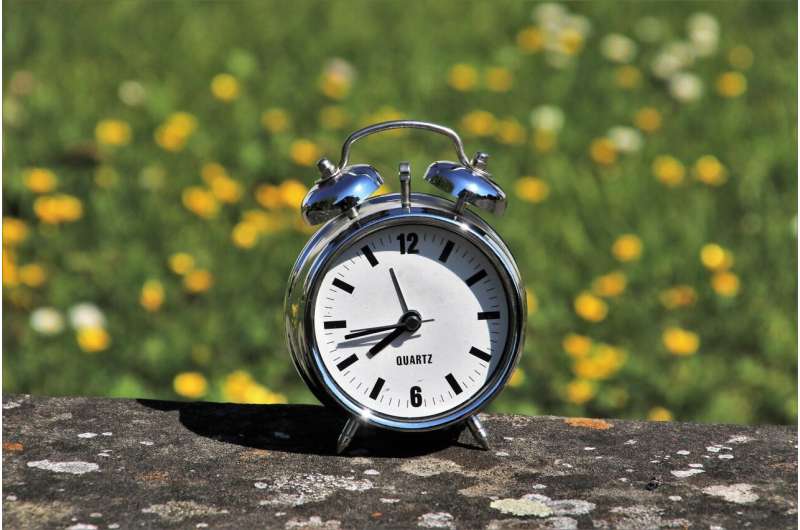
A team of leading sleep researchers from the British Sleep Society has called for the government to abolish the twice-yearly clock changes in the UK due to the adverse effects on sleep and circadian health.
After considering the available scientific evidence that circadian and sleep health are positively affected by the availability of natural daylight during the morning and negatively affected by the twice-yearly changes of clock time, especially when the clocks move forward in spring, the British Sleep Society recommends the abolition of the twice-yearly clock changes in the UK.
With sleep being central to health and well-being, the Society has issued a statement saying that it “strongly recommends” for Standard Time—also known as Greenwich Mean Time (GMT)—to run throughout the year.
The statement, which is published in the Journal of Sleep Research, is co-authored by academics from across the UK, led by Dr. Megan Crawford of the University of Strathcylde, Dr. Eva Winnebeck of the University of Surrey, and Professor Malcolm von Schantz of Northumbria University.
The Society has published its statement to coincide with the clocks changing to Standard Time this weekend, an arrangement that began in 1972 with the British Summer Time Act.
Evidence reviewed by the Society shows the changes of clock time to Daylight Saving Time (DST) in late March, more widely known as British Summer Time (BST), can interfere negatively with sleep regulation.
Malcolm von Schantz, Professor of Chronobiology at Northumbria University and a member of the Northumbria Centre for Sleep Research, said, “There is an ongoing debate in the UK and in other countries about whether twice-yearly changes to and out of Daylight Saving Time should be abolished.
“Standard Time aligns closely with the natural light-dark cycles of the day and night. In calling for Standard Time to run year-long, the Society emphasizes that natural daylight in the morning is crucial for maintaining an optimal alignment of our body clocks with day and night, which is essential for optimal sleep and overall health.”
Professor von Schantz added, “Restoring permanent Standard Time would mean our clocks would be closely aligned to solar time, and while it would mean earlier sunsets in the summer, there would be additional benefits to health from improved sleep and circadian alignment due to increased exposure to morning sunlight from autumn to spring.”
Dr. Eva Winnebeck, Lecturer in Chronobiology at the University of Surrey, explains, “What we often don’t realize is that Daylight Saving Time changes our schedules, moving them forward by one hour while daylight remains the same. DST forces us all to get up and go to work or school one hour earlier. In seasons with fewer daylight hours, such as now in autumn, it means most of us have to get up and commute in the dark.”
Members of the British Sleep Society assessed the unique geographical context and orientation of the UK in their decision making. Noting that almost the entire UK is located to the west of the Prime Meridian, which passes through the Royal Observatory at Greenwich, most of the country experiences later sunrises and later sunsets all year round.
The Society also noted that if the UK considers changes to the current time zone arrangements, then the discussion and decision should be taken in partnership with the Republic of Ireland to avoid a time zone border across the island.
“Discussions around abolishing the twice-yearly clock change keep emerging. Alarmingly, some want to replace it with Daylight Saving Time all year round,” says Dr. Megan Crawford, Senior Lecturer in Psychology at the University of Strathclyde.
“We consider this a misguided idea from a sleep and circadian health perspective. Mornings are the time when our body clocks have the greatest need for light to stay in synch. At our latitudes there is simply no spare daylight to save during the winter months, and given the choice between natural light in the morning and natural light in the afternoon, the scientific evidence favors light in the morning.”
She added, “Other sleep societies have argued against this and the return to all year-round Standard Time, but there is currently no published UK perspective. The unique location and orientation of our UK landmass needs to be considered because permanent DST would over-disadvantage people west and north of London.”
The full position statement from the British Sleep Society, titled “DST in the UK,” is supported by several organizations, including The Irish Sleep Society, British Paediatric Sleep Society, Capella (Sleep Action), The Sleep Charity, and The British Society of Pharmacy Sleep Services.
Experts in the Northumbria Centre for Sleep Research study and treat disorders of sleep and wakefulness, examining how biological, psychological, social and environmental circumstances affect sleep, as well as assessing, diagnosing and treating sleep disorders. Many studies are carried out within the Centre’s purpose-built two-bedroom en suite facility, which has a fully integrated kitchen and laboratory control room.
More information:
The British Sleep Society position statement on Daylight Saving Time in the UK: DST in the UK, Journal of Sleep Research (2024). DOI: 10.1111/jsr.14352
Citation:
Sleep experts call for UK to abolish twice-yearly clock changes (2024, October 23)
retrieved 23 October 2024
from https://medicalxpress.com/news/2024-10-experts-uk-abolish-yearly-clock.html
This document is subject to copyright. Apart from any fair dealing for the purpose of private study or research, no
part may be reproduced without the written permission. The content is provided for information purposes only.

